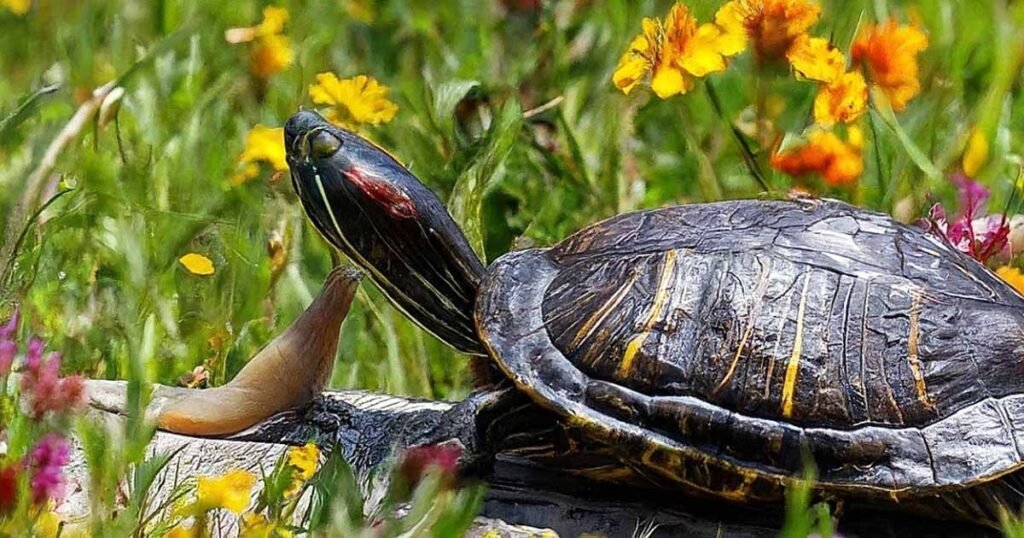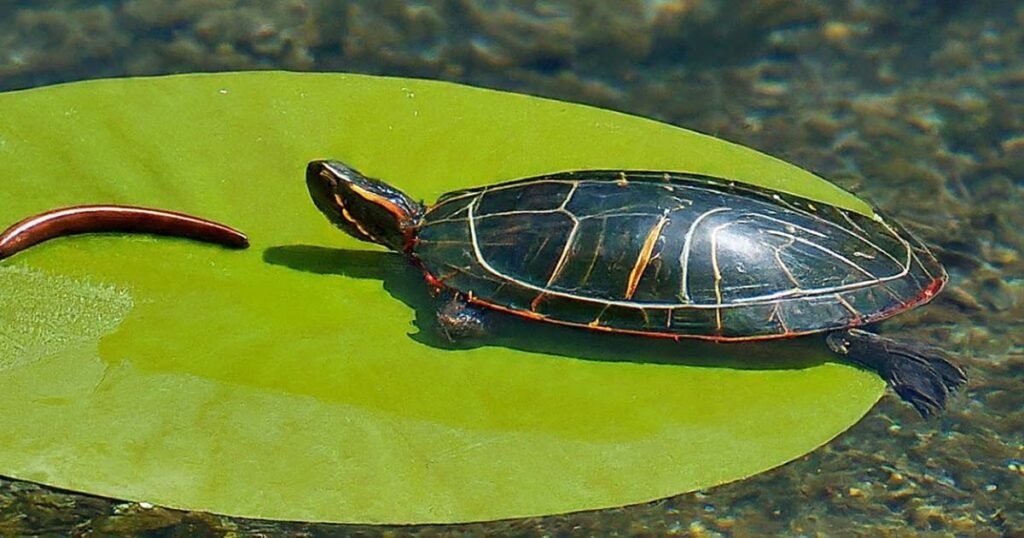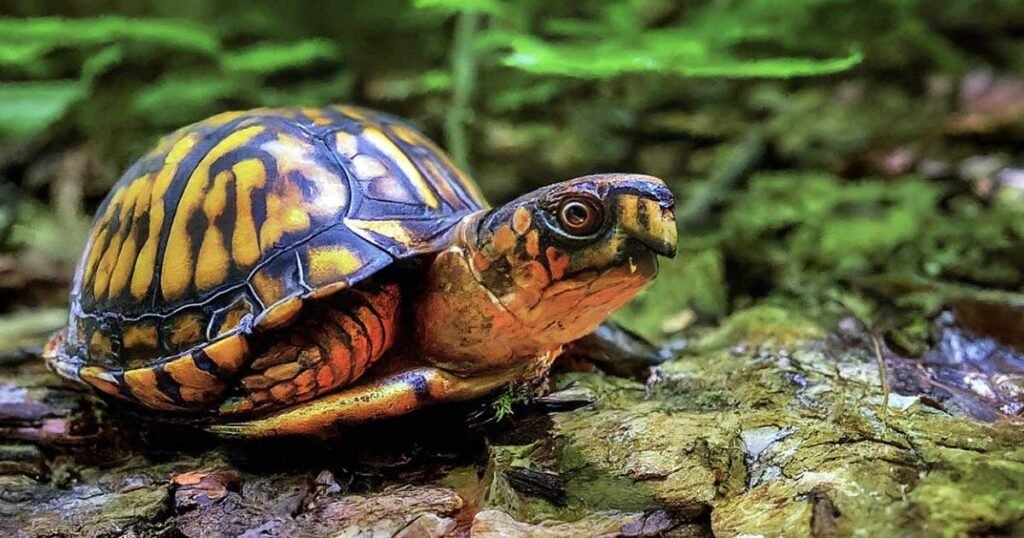Having turtles in your garden can be a delightful experience. But have you ever seen your pet turtle peering at a slug and wondered, “Do turtles eat slugs?” Turtles can eat slugs safely. But, the answer is a little more complex than a simple yes or no because you should refrain from feeding them slugs frequently.
Slugs can actually be a nutritious addition to a turtle’s diet, packed with protein, vitamins, and minerals. As we said, there are some important considerations to keep in mind. Let’s dig deeper into this question – “Do turtles eat slugs?” and more details about the slug diet.
Do Turtles Eat Slugs?

Yes, turtles can munch on slugs. Slugs are primarily snails without hard shells. These slimy creatures can offer a little protein boost, along with some vitamins and minerals. They even have some calcium, which helps keep a turtle’s shell strong.
However, when making turtles’ diets, you have to be conscious not to make slugs their staple. Too much can cause some health risks for them. Wild slugs can carry parasites that could make your pet turtle sick. They might also have been exposed to pesticides in your garden, which can be harmful to turtles.
What are the Benefits of Eating Slugs for Turtles?
Well, while they might not be the most nutritious snack, slugs can offer a few interesting benefits for your shelled friend:
Protein Pack
Just like we need protein to stay strong, so do turtles! For their size, slugs are surprisingly protein-rich. They can contain between 12% and 16% protein per 100 grams. It is a good thing for the turtles to build strong muscles and keep their bodies healthy.
Hydration Boost
Some turtle species aren’t big water drinkers. But guess what? Slugs are pretty darn juicy. So, a slug snack could give your turtle a little extra hydration boost, especially on hot days.
Good for Digestion
Turtles, like most creatures, prefer foods that are easy to digest. The soft, slimy texture of slugs might make them easy for your turtle’s digestive system to handle.
Other Nutritions
There’s some evidence that slugs might offer more than just protein and moisture. They might contain essential fatty acids that contribute to healthy skin and shells. Also, a range of minerals, like calcium, is necessary for strong bones.
Convenience for the Casual Muncher
Since both turtles and slugs are slow-moving creatures, slugs might be a convenient food source in the wild. The concept is simple: turtles are slow, so it is hard for them to catch things that move too fast. Slugs are also slow-moving insects, which makes them easy for turtles to catch.
Important Note: While these potential benefits exist, it’s important to remember that the research on slugs and their impact on turtle health is a little limited. Additionally, there are significant risks associated with feeding wild slugs to turtles (parasites, pesticides, etc.). It’s always best to consult a veterinarian or experienced turtle owner before introducing anything new to your turtle’s diet.
What Types of Slugs Turtles Can Eat

Some turtles enjoy slug snacks, especially omnivorous and carnivorous species like red-eared sliders and box turtles. But before you grab a garden slug for your pet, let’s dig into the safety considerations:
Wild Slugs: Risky
While it might be tempting to grab a slug from your garden, it’s generally not recommended. Wild slugs can carry parasites that can make your turtle very sick. There’s also a chance pesticides poisoned them.
The Safe Snack Option: Captive-Bred Slugs
If you’re considering slugs as part of your turtle’s diet, opt for commercially raised feeder slugs from pet stores or specialized reptile food suppliers. These slugs are raised in controlled environments free of harmful chemicals and parasites. These types are the safest choice for your shelled friend.
Slugs: The larger one
Turtles can indeed eat giant slugs, but size might not be the only factor. Make sure you give them pieces of appropriate size to avoid choking hazards. A wise rule of thumb is to serve the slugs no more significant than your turtle’s head.
Slug Eggs: Not a Primary Target
While turtles might encounter and eat slug eggs along the way, they’re not typically a primary food source. For a balanced and nutritious snack, give them whole slugs.
Slug Pellets: Proceed with Caution
Limited information exists on commercially available slug pellets specifically designed for turtles. It’s best to consult a veterinarian before introducing anything new to your turtle’s diet, including commercially produced slug pellets.
Potential Risks of Slugs for Turtles

While slugs might seem like a natural treat for your turtle, hidden dangers are lurking in their slime. Here’s why it’s generally advisable to avoid wild slugs in your turtle’s diet:
Parasites and bacteria
Wild slugs can carry nasty parasites and bacteria, which we already mentioned above. These tiny hitchhikers can make your turtle very sick, causing respiratory problems, lethargy, and even loss of appetite.
Pesticides and Poison
Pesticides used to control other pests might have come into contact with slugs from gardens or farms. If your turtle eats a slug with these chemicals, it could lead to poisoning. Symptoms can range from mild tummy troubles to severe neurological issues or even death.
Metaldehyde Mayhem: A Toxic Threat
Metaldehyde is a common ingredient in garden slug pellets. This substance is highly toxic to pets, including turtles. Even if a slug eats a metaldehyde pellet and then your turtle eats the slug, it can still pose a severe threat. Signs of metaldehyde poisoning include excessive drooling, tremors, and seizures.
How to Safely Serve Slugs to Your Turtle?
Slugs might seem tempting, but remember the risks: parasites, pesticides, yikes! Do you still want to sell them (commercially raised are the safest!)? Here’s how to minimize danger:
- Skip the wild: Slugs in the wild are bad.
- Shop Smart: Get captive-bred, parasite-free slugs from pet stores.
- Quarantine Cuisine: Isolate slugs for a day or two before feeding.
- Size it Right: Cut giant slugs into bite-sized pieces for your turtle.
- Wash Your Hands: Hygiene is vital, even with store-bought slugs.
- Monitor Munching: Watch for any changes in your turtle’s health after feeding.
Remember: Feeder insects are still the safest bet, as we have already stated above! They offer the good stuff (nutrients) without the hidden dangers of wild slugs. Skip the slimy snacks and keep your turtle happy with approved insect treats!
How Much Slug is Right for Your Turtle?
Let’s talk about portion control. If you want to offer slugs as a treat (remember, feeder insects are a safer option!), keep it occasional—think once or twice a week, max. It allows you to include other protein sources and a mix of healthy fruits, veggies, and leafy greens for a well-rounded diet.
Here’s the ideal turtle diet rule: A turtle’s diet typically consists of about 20-30% protein, and slugs can help provide that protein.
FAQs
Do box turtles eat slugs?
Yes, box turtles love to eat slugs. Slugs are a favorite snack for box turtles in the wild. They’re nice and juicy and offer a bit of protein to keep these shelled friends strong. Box turtles might also munch on insects, worms, and even small fish if they have the chance! So, yes, slugs are definitely on a box turtle’s yummy list.
Do aquatic turtles eat slugs?
Aquatic turtles will happily eat slugs in the wild. However, this is not ideal. Most marine turtles are meat-eaters, and slugs contain protein but don’t provide the nutrients they need. Instead, skip the slimy wild snacks and go for commercially prepared pellets or frozen foods designed for aquatic turtles.
Do eastern box turtles eat slugs?
Yes, eastern box turtles consume slugs as their delightful meal. Eastern box turtles and box turtles are not so different when it comes to their diet. Slugs and snails are typical food for them in the wild. But in captivity, eastern box turtles should not be served slugs as their main meal.
Read More: Do Turtles Eat Insects?
Wrap Up
For the question: do turtles eat slugs? The answer is a bit of a “maybe.” Turtles, especially those that eat a mix of plants and animals, might enjoy a slug snack now and then. However, there are some essential things to remember.
- Wild slugs can carry parasites and chemicals that can make your pet turtle sick.
- Commercially raised feeder insects are a safer and more reliable option for your turtle’s diet.
If you’re curious about adding variety to your turtle’s meals, talk to your veterinarian. They can help you create a balanced and healthy diet that keeps your shelled friend happy and thriving – including or excluding slimy slugs.
